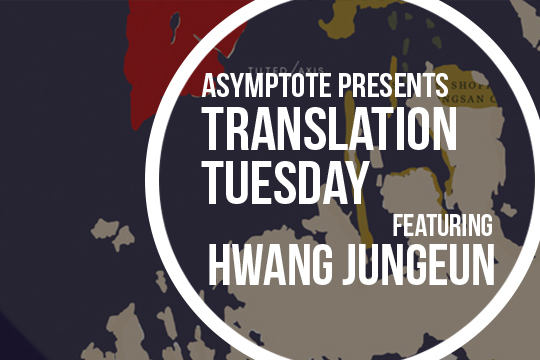If this year’s Man Booker International Prize-winning novel, Han Kang’s The Vegetarian, has whetted your appetite for Korean literature, we recommend that you check out Hwang Jungeun’s One Hundred Shadows, an oblique, hard-edged novel forthcoming from Tilted Axis Press. Set in a slum’s rundown electronics market, One Hundred Shadows depicts the little-known underside of Seoul, complicating the shiny, ultra-modern face which South Korea presents to the world. Here is an excerpt.
I said goodbye to Mujae at the subway station, where we each took different trains. By the time I got back to the area where I lived it was noon and the sun was blazing down as I dragged myself down the street. My stumpy shadow slanted to the right, bulging like a soft-boiled egg, its movements mimicking my own. When I thought about how it had risen now and then, the familiar shops and familiar alley didn’t look familiar at all. I turned into the alley and heard the sound of television leaking out of a window. It sounded like a volleyball match, with a voice saying spike, very clearly enunciated, sounding more electronic than human. Spike, spike, spike, and I turned another corner. Fancy hearing a voice saying spike, I thought, then put my hands in my pocket, unable to recall what had come after. A sharp piece of paper pricked my finger. I pulled it out and saw that it was the wrapper from Mujae’s gum. I bent it with my thumb, and it rustled like a shriveled ear.
I took down the pizza and fried chicken flyers that had been stuck to the door and stepped into the house. Inside it was dark, and seemed exactly how I’d left it even though I’d been gone a whole day. I took off my clothes, which smelled of soil, and went into the bathroom. I positioned myself beneath the naked bulb that dangled from the high ceiling, and looked down at my shadow. It looks a little bigger, I thought, and more thinned-out. I lifted my left foot up for a moment, then set it back down. I raised my right foot this time, put it down and lifted my left once more, then jumped up lightly so both feet were off the ground. The shadow spread out, a little thinner and wider, and definitely touched my feet when I put them down on the floor. I did a couple of jumps in my bare feet, examined the light bulb, then turned on the hot water and washed my hair. Wiping the suds from my eyes, I thought to myself that even if my shadow had drawn me deep in the woods, so deep that I never returned, someone would still have stuck flyers on the door, and pizzas would still have been sold. I went back into the main room, lay down and pulled a blanket over myself. The weather was sultry, but my toes were cold. I wondered if this was because I had my feet pointing north, and shifted them a little to the east, my head a little to the west. But this didn’t feel comfortable so I kept on shifting, again and again. I moved around so much I ended up back in my original position, but something still wasn’t right. I felt as if my lower back had lifted up off the floor, the whole of me trembling like a compass needle. Falling in and out of sleep, haphazard thoughts flitted through my mind.
I worked at an electronics market, a ramshackle warren of tiny shops close to the heart of the city. The market had originally consisted of five separate buildings, labelled A, B, C, D and E, but had been altered and added to over a period of forty years so that it was now a single structure. You had to know where to look to spot the signs that it had ever been otherwise. The market was where I first met Mujae. I manned the customer desk and ran errands at Mr. Yeo’s repair shop, while Mujae was an apprentice at a transformer workshop. One day I went down there with an old transformer that needed its copper wire replaced. There in that cramped space was Mujae, wearing wrist guards and an apron. Next to him, Mr. Gong was spinning the wheel with the copper wire twined around it. I held out the old transformer, needing both hands to lift its weight. Mujae took it casually in one, put it down on the table among all the copper wires, and made a note of the shop’s name and phone number. The only remarkable thing about him was his beautiful handwriting. I’d seen him several times before, on my way in and out of the building or running errands to other workshops, but nothing had made those encounters stand out.
I nodded off, wondering whether I would see Mujae at work on Monday, since we said, See you on Monday? When I started awake, the sun was about to go down. The light of the setting sun filled the room. I realised that I’d left my packed lunch in the woods.
READ MORE…


